- Home
- John Jakes
The Rebels: The Kent Family Chronicles Page 25
The Rebels: The Kent Family Chronicles Read online
Page 25
Not a sound came from Mayo Adams. But Philip had the uncomfortable feeling that the brewer’s apprentice was still awake.
Staring at him.
Watching him.
And maybe thinking secret thoughts—?
iii
Two things plagued the Americans encamped above Philadelphia. One was in the past, the other yet to come.
The first was the devastating plunge in morale produced by news from the north. Practically on the anniversary of the declaration of a year ago, the American defenders of Fort Ticonderoga had been forced to evacuate the position as untenable. Gentleman Johnny Burgoyne was marching south from Canada with eight thousand British soldiers, Canadians, and Iroquois tribesmen recruited by the king’s agents.
Word of Ticonderoga’s recapture had arrived in the Pennsylvania encampment in mid-July. Virtually every man took it as a grim sign. Horatio Gates, a capable American general, was supposedly moving to blunt Burgoyne’s thrust. But there was no guarantee he could do it. God knew what bloodshed was being perpetrated in northern York State this very moment.
Then there was the second worry—the future.
The uneasiness sprang directly from no one knowing the whereabouts of General Sir William Howe, His Majesty’s commander-in-chief in America.
For months, Howe had dallied at New York. First there were reports that he intended to go north to link up with Burgoyne. Then other reports said his objective was Philadelphia. All the while, his troops remained garrisoned in New Brunswick and Amboy, supplied from across the Hudson and capable of retaking the whole of Jersey—if they received orders.
Howe was too busy to issue orders. He was occupied with balls and fetes in the captured city. And, so the story ran, with his new blonde mistress, one Mrs. Loring.
The charming lady’s husband, a fervent Boston Tory, had been appointed commissary-general in charge of American battle prisoners. The position permitted Loring to fatten his own purse by selling off prisoner rations at a profit. The scoundrel seemed happy with his lot—and not the least jealous when General Howe commandeered his wife for a bed-partner. Perhaps, in some bizarre way, he considered her surrender a duty to the Crown that was making him rich.
At last, in late July, Howe had moved—but in an unexpected direction. He and his Jersey army disappeared into the Atlantic aboard the three hundred ships commanded by Howe’s brother. Somewhere on the ocean, that armada cruised out of sight of shore—and no one could say where the eighteen thousand British and Hessians would ultimately land. Nearly every day, new rumors reached the Pennsylvania camp—
Howe had been sighted off the Virginia capes—
No, he had not.
Yes he had, but the fleet was gone again.
Whatever the truth, it seemed obvious to Philip and his messmates that the plan to relieve Burgoyne had been abandoned. So what would be Howe’s objective? A southern port? Philadelphia, where a nervous Congress was receiving a stream of foreign officers who had sailed to America bearing papers from Silas Deane, the commissioner in Paris? The papers guaranteed the foreign officers high ranks in the Continental army in return for their services. Guaranteed it! Their American counterparts complained, with justifiable bitterness.
Some of the soldier-adventurers were reasonably well qualified. Washington had already appointed a skilled Polish engineer, Kosciusko, to a colonelship in that “learned” branch of the service. But many of the officers were not qualified for much of anything, and had only come to the new country in hopes of deposing some native-born officer—for profit.
And tomorrow, Philip thought, dozing again, a new contingent of Europeans was due to arrive.
Well, it would provide diversion. Something to break the endless tedium of the days spent waiting and wondering when Howe’s flotilla would appear again; and where.
iv
The drummers hammered in the blistering sun. The fifers tootled the melody of The White Cockade. Standing in the ranks on the parade field, his musket held at shoulder firelock position, Philip squinted across the sere grass toward the approaching horsemen. Out in front of Philip’s company, the commander, Captain Walter Webb of Worcester, stood as straight as the spontoon he gripped in his right hand.
Philip wished he could wipe the sweat off his forehead. It trickled down both sides of his nose and into his eyes. He had trouble seeing the brightly uniformed officers cantering toward the Massachusetts companies.
Of course Washington was immediately recognizable because of his white mount and his customary blue and buff. But the two men beside him, riding out ahead of the staff officers, were unrecognizable blurs—
Until they drew up opposite Philip’s company. Suddenly one of the two with Washington reined in. Philip gasped aloud at the sight of a long-forgotten face.
A youthful face. Aristocratic. Crowned under a tricorn by red hair far brighter than the commanding general’s. But Philip was sure his own eyes were playing tricks—
No, no, there could be no mistake. It was the same face; a face he’d first seen in a howling blizzard near his mother’s inn, when he’d come upon a thirteen-year-old boy struggling with two would-be kidnappers. The boy had been born to the French nobility; destined for a military career—
The Marquis de Lafayette caught Washington’s attention, pointed. Next to Philip, Lucas Cowper said under his breath:
“My Lord, he’s singling out somebody in this company!”
Washington stood in his saddle, spotted Philip. The general’s face seemed to register recognition too; perhaps from that night in Vassall House before the expedition with Knox.
Washington said something to Lafayette. Instantly, Gil’s face burst into a smile.
Royal Rothman, his cap concealed under his round-brimmed hunting hat, hissed from the front rank where the shortest men stood:
“It isn’t me. It’s somebody behind me.”
“Damn if that froggy ain’t wavin’ at you, Kent,” Mayo Adams said from directly behind. “How’d you git your ass in trouble this time?”
Unbelievably, Washington himself had now ridden back to consult with a staff officer. The main body of the inspection party rode on, Lafayette casting one glowing smile back across his shoulder. The staff officer wheeled his horse toward Captain Webb, who appeared ready to fall over in a faint from the sudden flurry of attention.
The staff officer dismounted, spoke with Webb. Philip could hear their voices but not the words. Then Webb’s eyes literally bugged.
As the staff officer re-mounted and cantered away, Captain Webb turned to give Philip a disbelieving stare. Lucas Cowper whispered again:
“Philip, do you know that officer who went by?”
“Yes, I do.”
From behind, Mayo Adams sneered, “Way it’s goin’, Kent’s liable to be suppin’ with old George ’fore long. My God, I didn’t know we were in such highfalutin company.”
But Adams’ jibes couldn’t unsettle Philip now. He was too stirred by memories, by excitement, by the astounding reappearance of the young man who had given him the treasured sword—
The young man Philip had never expected to see again in all his lifetime.
Then he recalled something the young marquis had said the last time they met at Marie Charboneau’s inn, just before Gil returned to Paris for more military training. Something about comrades in arms always encountering one another again on battlefields.
Comrades in arms. Gil had said they were exactly that because Philip had saved his life—
And the prediction had come true.
Officers began to shout orders to break up the review formation. Captain Webb barked Philip’s name and headed straight for him:
“Kent, are you aware of the identity of that Frenchman? The one who singled you out?”
“Yes, Captain, I am. Let’s see whether I can give you all his names—”
Philip’s friends crowded around, listening. Even Mayo Adams lingered, a disgusted curiosity on his face. Philip recalled the
names one by one:
“Marie Joseph Paul Yves Roch Gilbert du Motier—”
Webb continued to look utterly stupefied as. Philip added:
“His hereditary title’s Marquis de Lafayette. I always called him Gil.”
“Pretty damn familiar!” Webb exclaimed.
“I was born in France, Captain. I knew him there. His family home was in the same province as mine.”
“Well, I don’t care what you called him then, you’re going to have to call him sir when you go to supper.”
“Supper?”
“Why d’you suppose that major rode over here? You’re to clean up and report to the marquis’ pavilion at six on the dot. And you’d better not forget the Congress just appointed him a major general.”
That touched off an explosion of exclamations. Philip joined in:
“He can’t be more than nineteen!”
“Looks younger, if you ask me. But he’s still a general attached to Washington’s personal staff. And the major passed the word that the old man’s taken a strong liking to him. You’d best be on your good behavior.”
Abruptly, Philip was overcome with apprehension. He was excited at the prospect of a reunion with his boyhood friend. But a meeting between a common private and a freshly commissioned major general—that was something else entirely. He spent the rest of the afternoon nervously washing, shaving, sewing all the ragged places in his best shirt and trousers—and withstanding jokes from the men in his mess.
There were no jokes from Mayo Adams, though. He treated the whole business with silent contempt.
v
“Uh—sir?”
The young Frenchman seated inside the spacious officer’s tent jumped up from his camp chair and ran around the table where exquisite china, silver and glassware had been set for two. The orderly held the entrance flap aside, but Philip hesitated, uncertain as to whether he should salute.
Gil seized both his shoulders, his face almost glowing as he exclaimed in French:
“My God, Phillipe—it is you! Ranks and titles are forgotten here. It is Gil and—no, no, I was told you were someone else! A new name?”
“Yes. Philip Kent.”
“Gil and Philip, then! Long-lost comrades reunited!”
He embraced Philip so ardently, kissing him on both cheeks, that the orderly blushed.
Gil took Philip’s arm. “Come in, come in—we will dine and talk. But what shall it be? French? Or the English I speak so badly?”
“My French is pretty well forgotten,” Philip said with an apologetic smile. Though several years older than the handsome nineteen-year-old, he still had a feeling that he was the junior in the relationship. Even at thirteen, Gil had been a commanding presence; the tutor who gave Philip his first rudimentary lessons with the musket and spontoon. “But we can try, if you wish—”
“It’s easier, easier,” Gil continued in French as he pulled back a chair for his guest. “Be seated! Tell me everything! Where you live, your fortunes—everything.”
“I’d like to. But honestly, Gil, it—it isn’t necessary for you to entertain me this way—” He indicated the elegant table. “You’re a high-ranking member of the staff. I’m only—”
“Only my friend. My savior,” Gil said with utter seriousness. His hazel eyes held Philip’s. “I remember very distinctly that I would not be here in the glorious new land of freedom if you hadn’t happened along that road near Chavaniac when I was in danger. I’d be a major general of the worms, very likely. So let’s have no more folderol about rank—” He grinned. “That is a direct order.”
Philip laughed. “All right—General. I still have the sword you gave me. It hangs over the mantel in our home in Massachusetts—” The language was slow going, but Philip took his time, translating each phrase carefully out of the more familiar English. Gil’s sandy eyebrows hooked up at the last remark: “‘Our home.’ You are married, then?”
“Yes, to a girl I met in Boston.”
“Children?”
“One son. He’ll be two in September.”
“How marvelous, wonderful!” Gil reached under the bosom of his uniform, pulled out a golden locket on a slender chain. “This is rather a delicate ornament for a soldier. But my own dear heart insisted I bring it with me—”
Proudly, Gil thumbed the locket open to display a beautifully done miniature of his attractive, fragile-looking wife. Philip judged her to be little more than fifteen or sixteen.
The marquis snapped the locket shut, signaled to the orderly, said in heavily accented English:
“Set the meal, please—and the wine. Then leave us.” The orderly wheeled and hurried out.
“Gil, how in God’s name did you get here?”
“Well, service to your new country has become popular in many parts of Europe. The splendid declaration against King George last summer—you’ve no idea how it fired the minds and hearts of Frenchmen!”
“And inspired some private help from your king.”
“The bogus trading company? Yes, I’ve heard of it. Officially, of course, France takes no position in the war. As yet,” he added in a significant way. “One may hope—”
He shrugged. “For the present, it’s enough that volunteers may cross the ocean to offer their swords. In my case, I’m afraid King Louis felt the Lafayette name a trifle too prestigious for even that to be allowed.” He made a face to demonstrate his displeasure.
“You mean it was suggested you shouldn’t come?”
“Suggested hardly covers it. I was on garrison duty in Metz when word reached me about the noble declaration. I have never been so overcome—so moved. I decided at once to speed here to support your cause.”
Finally relaxing a little, Philip smiled. “I also recall you didn’t think too highly of the British.”
“That’s true—as well as an understatement. Unfortunately, members of my family were determined I should not risk my career in this venture—nor lend the Lafayette name to what remains, in official circles, an illegitimately conceived nation. King Louis even issued a writ forbidding my journey. Had the paper ever caught up with me, I’d have been clapped away in the Bastille until my enthusiasm for America cooled. As it was, I rushed overland in secret—I took ship at Los Pasajes in Spain—and I landed early in July in your Charleston.”
“South Carolina?”
“Quite so. Then I traveled nine hundred miles more—in carriages I paid for myself—also on horseback when the carriages broke down. When I reached the Congress in Philadelphia, I was given a decidedly rude reception, at least in some quarters. A Mr. Lovell of that body remarked that French officers had a great fancy to enter American service without being invited. In short, I was treated like the rankest freebooter.”
“We’ve had some of those show up, though.”
“Nevertheless, it was an insult. Since I had come here out of the purest motives, and at my own expense, I demanded two favors of the Congress. To serve at my own cost, and entirely as a volunteer—requiring no rank or command. Though naturally I hope to have the honor of field command at some time in the future. I am well trained for it, after all.” He still sounded a bit miffed. “And training seems sorely needed in this army. I was agog this morning. That is the only word—agog. No uniforms! Merely—forgive me!—those peculiar shirts such as you’re wearing. Then I watched a bit of drill. An absolute shambles! A drillmaster’s badly needed—”
“Gil, I’m afraid Washington has neither the money nor the talent to put together the kind of army you’re accustomed to.”
“Aha, but European officers are arriving who can do something about that! They must be given the opportunity! Else your cause—our cause—is surely lost.”
Glum, Philip told him, “I don’t doubt the general would welcome really good assistance.”
“Yes, a magnificent man, magnificent! I told him I wished for nothing more than to be allowed to serve near his person till such time as he thought it proper to entrust me with a division.�
�� With an emphatic flick of one of his epaulettes, he added, “I did not insist upon a major generalship. However—” Another shrug, and a wink. “It is certainly a step in the right direction.”
Philip smiled again. So did his friend. The orderly returned, followed by two Frenchmen: one a cook in a white smock, pushing a wood-wheeled serving cart, the other a liveried waiter who proceeded to serve the meal and decant the wine. Philip discovered that Gil wasn’t exaggerating about paying his own way:
“I want no one in this command to think I am living in my accustomed style at their expense, Philip. Everything you see, I purchased. The venison, the wine—this uniform, the tent, even my horses and wagons. I am of the opinion that perhaps I have more dedication to the American purpose than some of your own rude Congressmen.”
“I don’t doubt it. More money, too.”
“A hit, a most accurate hit!” Gil cried, clapping one hand over his heart in false pain.
There was no longer any barrier of hesitancy between them. Philip’s uneasiness had completely vanished, and he fell to enjoying the excellent meal, the wine and the conversation with unashamed gusto. The talk was virtually continuous because both friends had much to tell.
Philip related all of his up-and-down history since Gil had ridden away from Auvergne that long-ago day. He only omitted the most unflattering parts—his killing of Roger Amberly and his dalliance with Alicia before he finally made up his mind about Anne Ware and the American cause.
For his part, Gil was ready with anecdotes about military life, as well as acid comments about the American commissioner in Paris, Mr. Deane, who was “frantically” issuing letters to European officers, promising them exalted posts and high wages—without specific authorization from the Congress. Presently, when the table had been cleared and a lantern lighted and hung at the open end of the tent, Gil offered a toast with brandy:
“To my comrade Phillipe—ah, I forget so easily. Philip! May he and his country live in liberty forever.”

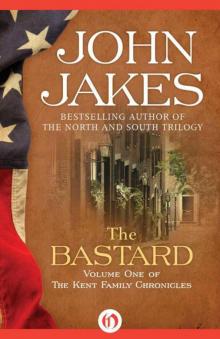 The Bastard
The Bastard The Furies
The Furies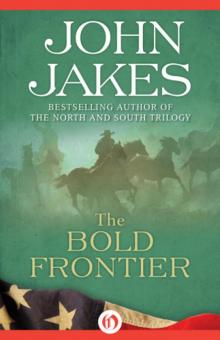 The Bold Frontier
The Bold Frontier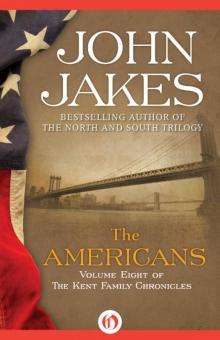 The Americans
The Americans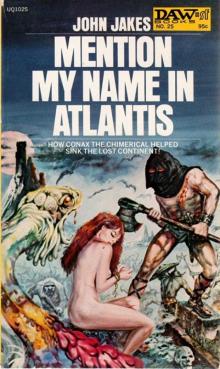 Mention My Name in Atlantis
Mention My Name in Atlantis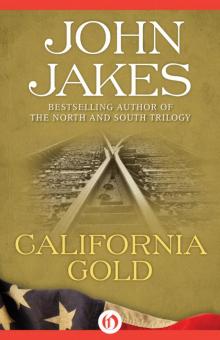 California Gold
California Gold North and South
North and South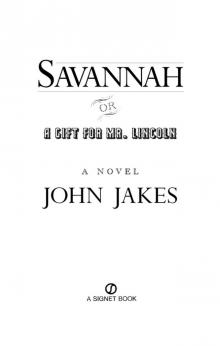 Savannah, or a Gift for Mr. Lincoln
Savannah, or a Gift for Mr. Lincoln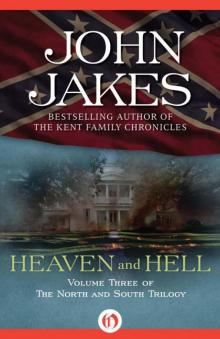 Heaven and Hell
Heaven and Hell Homeland
Homeland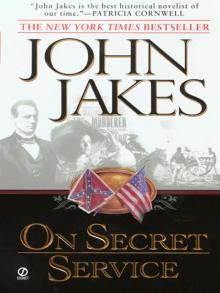 On Secret Service
On Secret Service The Lawless
The Lawless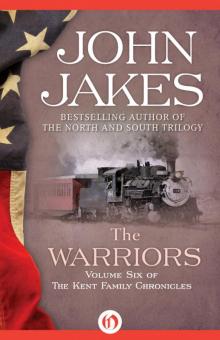 The Titans
The Titans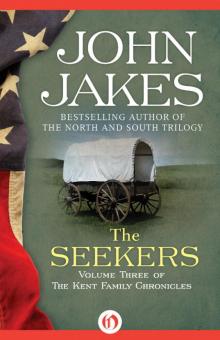 The Seekers
The Seekers Love and War
Love and War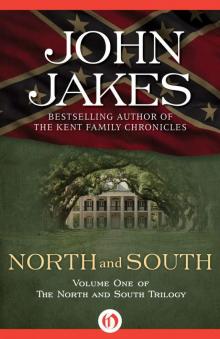 North and South: The North and South Trilogy (Book One)
North and South: The North and South Trilogy (Book One)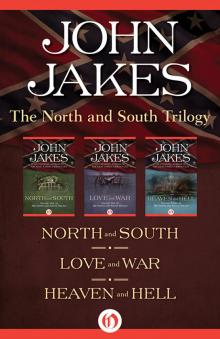 North and South Trilogy
North and South Trilogy Love and War: The North and South Trilogy
Love and War: The North and South Trilogy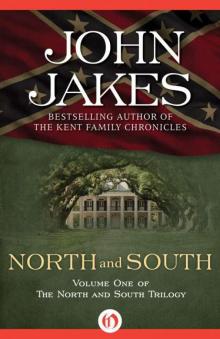 North and South: The North and South Trilogy
North and South: The North and South Trilogy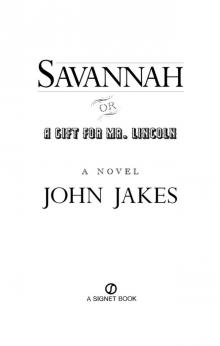 Savannah
Savannah Lawless
Lawless Conquest Of The Planet Of The Apes
Conquest Of The Planet Of The Apes Love and War: The North and South Trilogy (Book Two)
Love and War: The North and South Trilogy (Book Two) The Rebels: The Kent Family Chronicles
The Rebels: The Kent Family Chronicles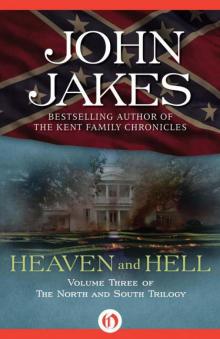 Heaven and Hell: The North and South Trilogy
Heaven and Hell: The North and South Trilogy Planet of the Apes Omnibus 2
Planet of the Apes Omnibus 2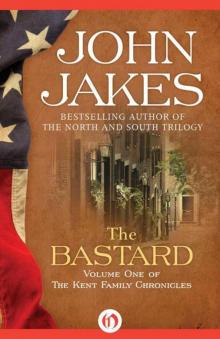 The Bastard: The Kent Family Chronicles
The Bastard: The Kent Family Chronicles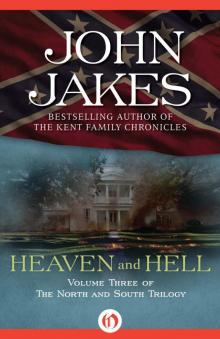 Heaven and Hell: The North and South Trilogy (Book Three)
Heaven and Hell: The North and South Trilogy (Book Three)